638
When you change the world, and no one noticed
Know what's going on in this picture? Literally one of the most important events in the history of mankind.
And the most amazing thing about this story is that while almost no one noticed.
Brothers Wilbur and Orville Wright conquered the flights of 17 December 1903. Few inventions have changed the world so much over the ensuing century. Travel by train from new York to Los Angeles was in the 1900 four days. By 1930 it can be done 17 hours in the air. By 1950 six hours.
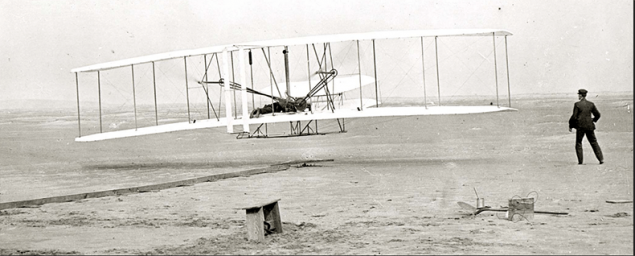
Unlike, say, the sequencing of the genome, the layperson can immediately grasp the wonder of flight for humans. The man was sitting in a box and turned into a bird.
But after a few days, months or even years after first flight of Wright, almost no one noticed.
Here's the first page of The New York Times the day after first flight:
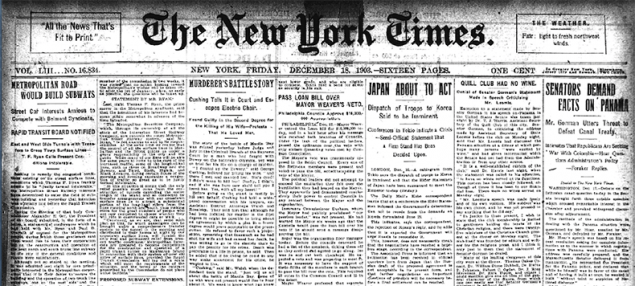
Not a word about Wright. Two days later – again nothing:
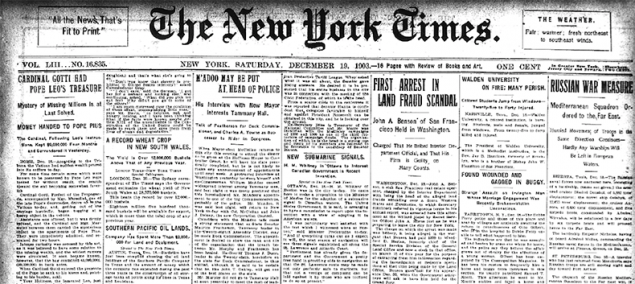
Three days later, when Wright made the fourth flight, which lasted almost a minute. Nothing:
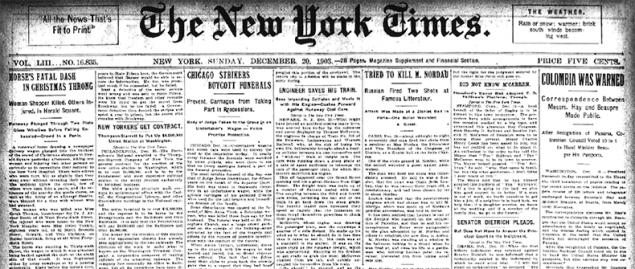
And so on. Four days, five, six, six weeks, six months... not a single mention about people who have conquered the sky for the first time in the history of mankind.
In the Library of Congress where I found these Newspapers, I discovered two interesting details. First, the first mention of Wright in The New York Times appeared in 1906, three years after their first flight. Second, in 1904, the newspaper asked the Mogul balloons, will people ever fly. He replied:

"In the very very distant future," said the count, and focus on the word "very", and shrugging his shoulders, hinting at eternity, "may be flying machines, but not now, not now."
It was a year after the first flight of the Wright brothers.
In his book, 1952 in American history, Frederick Lewis Allen [Frederick Lewis Allen] wrote:
"A few years passed before the public realized what they do, Wright; the people were so convinced that flying is impossible that most of those who saw them flying over Dayton in 1905 decided that it was some kind of trick, having no particular importance – something like how people would react these days, for example, telepathy. In may, 1908, nearly four and a half years after the first flight, the experienced reporters were sent to see what the brothers experienced editor to believe in happy stories, and the world suddenly realized that human flight was successfully held.".
History Wright shows the General principle: often it takes a long time to how you change the world, and before you manage to convince people that you changed the world.
Jeff Bezos once said:
"Invention requires a willingness to ensure that you will not be understand. Are you doing something that you believe in than sure, but for a long time, people with sincere intentions are to criticize these attempts... If you really believe that they are wrong, you have to be prepared for the fact that you will not be understand. This is the key point of the invention.".
This is a very important message. Things that receive instant recognition typically represent existing products with slight modifications. We like them because they are familiar to us. Most innovative products – those that change the world – usually never perceived at once, even the smartest people.
So it was with the phone. Alexander Graham bell tried to sell his invention to Western Union, and received the answer:
This "telephone" has too many shortcomings to be seriously seen as a practical form of communication. The device is of no use to us. How can a company use this electric toy?
So it was with the car. For twenty years before Henry Ford convinced the world that he is on the right track, Congress issued this verdict:
Horseless carriages, driven by gasoline, can reach speeds of 14 or even 20 miles per hour. The threat to humans from such vehicles, roaring through our streets and roads and poisoning the atmosphere, requires quick adoption of laws. The production cost of gasoline is too large for private enterprises... in addition, the development of engines may penalize use of horses that will break all our agriculture.
It happened with an index Fund – one of the most important financial innovations of the last 50 years. John Bogle launched the first index Fund in 1975. No one gave him importance in the following twenty years. The popularity started coming to him gradually in the 1990s And then, three decades after the emergence, the idea has spread like wildfire.
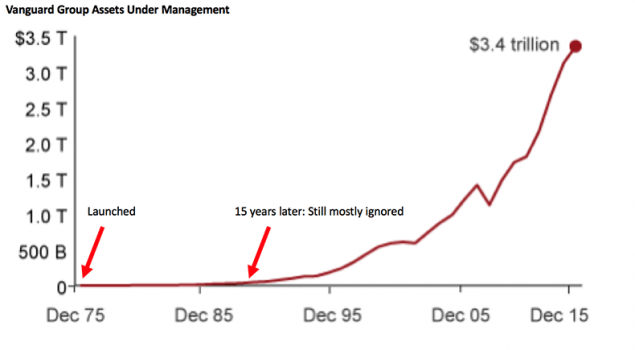
It is happening now. 3D printing is actively developing in the last five years. But this is not a new invention. Look at this interview with the Director of 3D Systems already from 1989.
SUBSCRIBE to OUR youtube channel that allows you to watch online, download from YouTube free video about the recovery, the rejuvenation of man. Love for others and ourselves, as the feeling of high vibrations — an important factor
3D printers, like many inventions, there is a delay of several decades between invention and adoption. Same with solar energy. Photovoltaics was opened in 1876. Commercial copies appeared in the 1950s, and Jimmy Carter placed solar panels on the White House in the 1970s. But they did not take off really until the late 2000s.
Great breakthroughs are usually the way to seven steps.
• First, nobody heard.
• Then I've heard of you and thought you were crazy.
• Then your product realized, but decided that he had no future.
• Then consider your product as a toy.
• Then your product is considered as an amazing toy.
• Then you start to use it.
• Then he can not imagine his life.
This process may take decades. It rarely takes less than a few years.
From this we can draw three conclusions.
To change the world, you need to be a genius. But to wait until this notice, have quite a different quality. "Zen patience," is not usually associated with the image of the entrepreneur. But it is often required, especially for products that are changing the world.
If innovation is measured by generations, it is not necessary to measure the results of quarters. History shows how long, messy and chaotic, can undergo changes. The stock market is a very funny story about how millions of people expect from current companies quick, neat and clean solutions. The difference between reality and expectations explains the disappointment.
10 pseudo-discoveries that shocked the scientific world20 exciting science series about all
The invention is only the first step of innovation. Stanford Professor Paul Sappho [Paul Saffo] describes it this way:
30 years old need a new idea entered the culture. Technology does not promote change. Them promotes our joint response to the opportunities and prospects offered by the technology.published
Put LIKES and share with your FRIENDS! -
ttps://www.youtube.com/channel/UCXd71u0w04qcwk32c8kY2BA/videos
Subscribe — www.facebook.com//
Source: m.geektimes.ru/post/280238/
And the most amazing thing about this story is that while almost no one noticed.
Brothers Wilbur and Orville Wright conquered the flights of 17 December 1903. Few inventions have changed the world so much over the ensuing century. Travel by train from new York to Los Angeles was in the 1900 four days. By 1930 it can be done 17 hours in the air. By 1950 six hours.

Unlike, say, the sequencing of the genome, the layperson can immediately grasp the wonder of flight for humans. The man was sitting in a box and turned into a bird.
But after a few days, months or even years after first flight of Wright, almost no one noticed.
Here's the first page of The New York Times the day after first flight:

Not a word about Wright. Two days later – again nothing:

Three days later, when Wright made the fourth flight, which lasted almost a minute. Nothing:

And so on. Four days, five, six, six weeks, six months... not a single mention about people who have conquered the sky for the first time in the history of mankind.
In the Library of Congress where I found these Newspapers, I discovered two interesting details. First, the first mention of Wright in The New York Times appeared in 1906, three years after their first flight. Second, in 1904, the newspaper asked the Mogul balloons, will people ever fly. He replied:

"In the very very distant future," said the count, and focus on the word "very", and shrugging his shoulders, hinting at eternity, "may be flying machines, but not now, not now."
It was a year after the first flight of the Wright brothers.
In his book, 1952 in American history, Frederick Lewis Allen [Frederick Lewis Allen] wrote:
"A few years passed before the public realized what they do, Wright; the people were so convinced that flying is impossible that most of those who saw them flying over Dayton in 1905 decided that it was some kind of trick, having no particular importance – something like how people would react these days, for example, telepathy. In may, 1908, nearly four and a half years after the first flight, the experienced reporters were sent to see what the brothers experienced editor to believe in happy stories, and the world suddenly realized that human flight was successfully held.".
History Wright shows the General principle: often it takes a long time to how you change the world, and before you manage to convince people that you changed the world.
Jeff Bezos once said:
"Invention requires a willingness to ensure that you will not be understand. Are you doing something that you believe in than sure, but for a long time, people with sincere intentions are to criticize these attempts... If you really believe that they are wrong, you have to be prepared for the fact that you will not be understand. This is the key point of the invention.".
This is a very important message. Things that receive instant recognition typically represent existing products with slight modifications. We like them because they are familiar to us. Most innovative products – those that change the world – usually never perceived at once, even the smartest people.
So it was with the phone. Alexander Graham bell tried to sell his invention to Western Union, and received the answer:
This "telephone" has too many shortcomings to be seriously seen as a practical form of communication. The device is of no use to us. How can a company use this electric toy?
So it was with the car. For twenty years before Henry Ford convinced the world that he is on the right track, Congress issued this verdict:
Horseless carriages, driven by gasoline, can reach speeds of 14 or even 20 miles per hour. The threat to humans from such vehicles, roaring through our streets and roads and poisoning the atmosphere, requires quick adoption of laws. The production cost of gasoline is too large for private enterprises... in addition, the development of engines may penalize use of horses that will break all our agriculture.
It happened with an index Fund – one of the most important financial innovations of the last 50 years. John Bogle launched the first index Fund in 1975. No one gave him importance in the following twenty years. The popularity started coming to him gradually in the 1990s And then, three decades after the emergence, the idea has spread like wildfire.

It is happening now. 3D printing is actively developing in the last five years. But this is not a new invention. Look at this interview with the Director of 3D Systems already from 1989.
SUBSCRIBE to OUR youtube channel that allows you to watch online, download from YouTube free video about the recovery, the rejuvenation of man. Love for others and ourselves, as the feeling of high vibrations — an important factor
3D printers, like many inventions, there is a delay of several decades between invention and adoption. Same with solar energy. Photovoltaics was opened in 1876. Commercial copies appeared in the 1950s, and Jimmy Carter placed solar panels on the White House in the 1970s. But they did not take off really until the late 2000s.
Great breakthroughs are usually the way to seven steps.
• First, nobody heard.
• Then I've heard of you and thought you were crazy.
• Then your product realized, but decided that he had no future.
• Then consider your product as a toy.
• Then your product is considered as an amazing toy.
• Then you start to use it.
• Then he can not imagine his life.
This process may take decades. It rarely takes less than a few years.
From this we can draw three conclusions.
To change the world, you need to be a genius. But to wait until this notice, have quite a different quality. "Zen patience," is not usually associated with the image of the entrepreneur. But it is often required, especially for products that are changing the world.
If innovation is measured by generations, it is not necessary to measure the results of quarters. History shows how long, messy and chaotic, can undergo changes. The stock market is a very funny story about how millions of people expect from current companies quick, neat and clean solutions. The difference between reality and expectations explains the disappointment.
10 pseudo-discoveries that shocked the scientific world20 exciting science series about all
The invention is only the first step of innovation. Stanford Professor Paul Sappho [Paul Saffo] describes it this way:
30 years old need a new idea entered the culture. Technology does not promote change. Them promotes our joint response to the opportunities and prospects offered by the technology.published
Put LIKES and share with your FRIENDS! -
ttps://www.youtube.com/channel/UCXd71u0w04qcwk32c8kY2BA/videos
Subscribe — www.facebook.com//
Source: m.geektimes.ru/post/280238/























